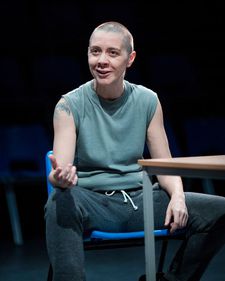In the tragedy, directed by Phyllida Lloyd, she plays Casca, “I had an affectionate name for myself, which was ‘Stabby McStabathon’ because I strike the first blow,” she says. Explaining her approach to the role, she adds: “I kind of have to go back just a little because the first Shakespeare I was in with Phyllida was Henry IV. I was playing Bardolph, who is the fall-off-the-stool drunk, so that was quite easy for me to play, although I did play two roles, I played Sir Richard Vernon who was a kind of nobleman. But I didn’t have much dialogue for him, so as much as I could touch on a bit of serious acting, it wasn’t very meaty.
“It felt easier and, as strange as this may sound, I’m quite versed in pantomime, and as much as you need subtleties in theatre, some of the things need big, broad strokes. Some actors are told, ‘Can you give us a little bit more here?’. My note is usually, ‘Dial it down, dial it down’. Then, in The Tempest, I played Trinculo, who’s the fool. So, to go to Casca, it was interesting. I went a bit too sedate and Phyllida said, ‘Bring it up a little’.
This production, in addition to having an all-female cast, is notable for the diversity of the casting. It’s a mix that means the language is read in a range of different accents, including Ayr-born Dunbar’s Scots brogue – the rhythms of which lend themselves to Shakespeare.
 |
| Karen Dunbar: 'At the end of the day, of course, I want to be authentic but I would like to be authentic with people there' |
“I’d never done Shakespeare before. I had read it, although ‘read’ is really pushing the boat out – I was there, I was present while someone was reading it out in English class. But I am quite a Robert Burns enthusiast. I had never realised the correlations between the two in the language. I’m very musical so I work very much to a beat and a rhythm and so to have come from performing quite a lot of Burns stuff, to then go into Shakespeare it didn’t feel too far.” One of the aspects that particularly appealed to the 46-year-old was the layered nature of the performance, which is framed as a play being performed by prisoners in a women’s jail. She described is as “an added excitement”.
She adds: “So, for example, when we were doing The Tempest, I never saw myself playing Trinculo. Phyllida, in her wisdom, she’s so creative. In the first week, she got us to go and create a prison character – ‘What’s your name?’, ‘Where do you come from?’, What are you in for?’, ‘What’s your history?’ So, when I came onstage, it didn’t matter what play it was. My [prison] name was Sally, and no offence to anyone named Sally, but I picked the name because I don’t particularly like the name and I, as that prisoner, did not like myself. Actually, when I look back on it, I find such an empathy for her now. God love her, she was pretty much a vagrant. She’d been very physically abused as a child and ended up on the streets as a petty criminal.
“We did things, like I was biting my finger nails right down and I shaved my head. And the shaved head wasn’t because Sally felt like shaving her head – somebody had held her down and shaved her head.”
The play was created as a collaboration with the charity Clean Break, which works with women prisoners and ex-prisoners to provide theatre-based education and training. Harriet Walter, who takes on the role of Brutus, is also a patron of the charity. The cast did three workshops in prisons as they prepared the play and Dunbar says it’s quite hard to put the experience into words.
 |
| Karen Dunbar as Casca: 'I’m quite versed in pantomime, and as much as you need subtleties in theatre, some of the things need big, broad strokes' Photo: Helen Maybanks |
It’s a reality that Lloyd lets intrude in her production/film itself – the inability of the prisoners, just like the characters in the play, to truly finish things. “That’s a complete reality,” says Dunbar. “Anything can happen. It can be in the middle of something they’ve worked on for months and months and months, and suddenly there’s a lockdown. And it’s not as if, ‘We’ll get back to it next week’ – it’s done. It’s just not going to happen again.”
One of the benefits of the film being a recording, albeit enhanced, of the stage production rather than something that was shot on sets, is that it gives a real sense of the physicality of the production. Dunbar describes it as: “Relentless and, at the same time, the adrenaline, the buzz.”
The company started rehearsals for the plays in August – they performed the three each day – and Dunbar says she finally came home on February 17. “I tell you something, I was like a racehorse,” Partly that [physicality of the production] and partly because we were in New York and it’s such a privilege to walk. So, between the walking and the stage walk, I did feel like, ‘I’m ready for the Olympic, challenge me’.
I’m not so sure about the Tokyo Games but this role proves Dunbar is an actress who also shines when taken seriously. Casting directors should take note.
For details for Julius Caesar and screenings, visit the official site. For more about Karen Dunbar, visit her website.
- Read what Phyllida Lloyd told us about Shaking up Shakespeare.
- Read what Jennifer Joseph and Jackie Clune told us about breaking the mould.
Watch the trailer:








![Julius Caesar meets a sticky end. Karen Dunbar, as Casca, top left: 'When I came onstage, it didn’t matter what play it was. My [prison] name was Sally, and no offence to anyone named Sally, but I picked the name because I don’t particularly like the name and I, as that prisoner, did not like myself'](/images/newsite/JuliusCaesar176_600.jpg)













